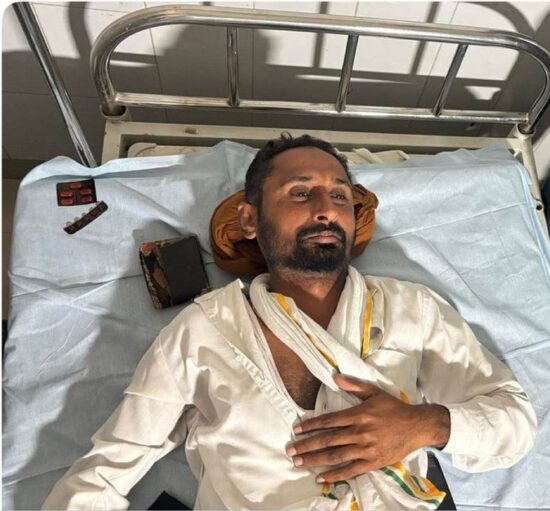 The case involving journalist Ranjit Gill from Gidderbaha has exposed disturbing allegations of intimidation and potential abuse of legal processes. Ranjit Gill, a working journalist in the region, was reportedly assaulted in an incident that should have warranted immediate police action and protection for the victim. Instead of pursuing justice for the journalist, concerning developments suggest that authorities may be attempting to suppress the matter through questionable means.
The case involving journalist Ranjit Gill from Gidderbaha has exposed disturbing allegations of intimidation and potential abuse of legal processes. Ranjit Gill, a working journalist in the region, was reportedly assaulted in an incident that should have warranted immediate police action and protection for the victim. Instead of pursuing justice for the journalist, concerning developments suggest that authorities may be attempting to suppress the matter through questionable means.
According to emerging reports, there are now efforts to file a false case against Ranjit Gill under the Scheduled Caste (SC) Act. This represents a troubling reversal where the victim of an assault is being threatened with criminal prosecution. Such tactics raise serious questions about the motivations behind this legal maneuvering and whether protective legislation is being weaponized to silence a journalist who dared to report being attacked.
Misuse of Protective Legislation
The Scheduled Castes and Scheduled Tribes (Prevention of Atrocities) Act was created with noble intentions to protect India’s most vulnerable communities from discrimination and violence. The Act provides stringent provisions to ensure swift justice for victims of caste-based crimes. However, there have been longstanding concerns about its potential misuse to settle personal vendettas or intimidate adversaries. In the case of Ranjit Gill, the alleged attempt to file a false case under this Act appears to represent precisely such an abuse of legal provisions meant to protect the marginalized.
Using protective legislation as a tool of harassment fundamentally undermines its purpose and creates a dangerous precedent. When laws designed to safeguard vulnerable populations are twisted into weapons against victims of violence, it damages the credibility of these important legal protections. It also creates confusion and cynicism about the legitimate application of such laws, potentially making it harder for genuine victims to seek justice.
Police Accountability in Question
The performance of the police in handling Ranjit Gill’s case has become a subject of intense scrutiny and criticism. Law enforcement agencies have a constitutional and moral duty to investigate crimes impartially and protect victims, especially journalists who play a vital role in maintaining democratic accountability. The police are expected to act as neutral arbiters of justice, not as instruments serving particular interests or power structures.
However, the developments in this case suggest potential failures at multiple levels. Questions arise about why the original assault on the journalist has not been pursued with appropriate vigor. Why is the victim now facing the threat of a counter-case instead of receiving protection and justice? These concerns point to either incompetence or compromise within the police machinery. If external pressures are indeed influencing police actions, it represents a serious erosion of institutional integrity and the rule of law.
The Broader Threat to Press Freedom
The Ranjit Gill case reflects a pattern of intimidation that extends beyond one individual journalist. When members of the press face not just physical violence but also the threat of false legal cases, it creates what is known as a “chilling effect” on journalism. Reporters may think twice before covering sensitive stories or reporting crimes committed against them if they fear the machinery of the state will be turned against them rather than protecting them.
Journalists, particularly those working in smaller towns and rural areas like Gidderbaha, often operate in environments where local power structures exert considerable influence. Unlike their counterparts in major metropolitan areas who may have greater institutional support and public visibility, regional journalists are more vulnerable to intimidation and less likely to have resources to fight prolonged legal battles. The attempt to silence Ranjit Gill through false cases could embolden others to use similar tactics against journalists who report uncomfortable truths.
Press freedom is not merely an abstract principle but the foundation of democratic governance. Journalists serve as watchdogs who expose wrongdoing, give voice to the marginalized, and hold those in power accountable. When they are attacked and then threatened with prosecution for reporting those attacks, the entire system of accountability breaks down. Citizens lose their eyes and ears in government and society, creating space for corruption and abuse to flourish unchecked.
The Need for Immediate Intervention
The circumstances surrounding Ranjit Gill’s case demand urgent action from multiple stakeholders. Higher authorities within the police department and the state government must step in to ensure that the investigation is conducted fairly and without bias. If local police are compromised or under pressure, the case should be transferred to an independent investigating agency that can work without interference. Journalist organizations and press unions have a responsibility to provide legal support to Ranjit Gill and to raise public awareness about this case as a matter of press freedom.
Civil society and human rights organizations must remain vigilant against the misuse of laws like the SC Act, which undermines both the protection of vulnerable communities and the integrity of the legal system. The judiciary has a critical role to play in preventing false cases from being registered as tools of harassment and ensuring that protective legislation serves its intended purpose. Public attention and pressure can also make a significant difference in ensuring that justice is served rather than perverted.
The original assault on Ranjit Gill must be investigated thoroughly, and perpetrators must face appropriate legal consequences. Simultaneously, any attempts to file retaliatory or false cases against the journalist must be exposed and prevented. The credibility of law enforcement, the justice system, and democratic institutions depends on their ability to protect victims and uphold the truth rather than serving those who seek to suppress it through intimidation and abuse of legal processes.
Skip to content
India Top New